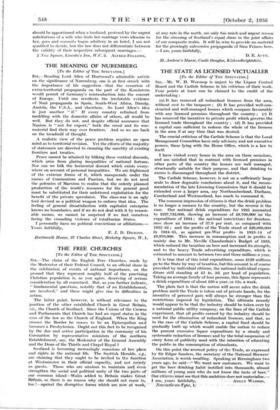THE FREE CHURCHES
[To the Editor of THE SPECTATOR.]
SIR,—The claim of the English Free Churches, made by the Moderator of their Federal Council, to an official share in the celebration of events of national importance, on the ground -that they represent roughly half of the practising Christian population is; as you agree, deserving of serious consideration by all concerned. But, as you further indicate, " fundamental questions, notably that of an Establishment, are involved," and these might give rise to difficulties in action.
The latter point, however, is without relevance to the position of the other established Church in Great Britain, viz., the Church of Scotland. Since the Unions of the Crowns and Parliaments that Church has had an equal status in the eyes of the law as the Church of England. When the King crosses the Border he ceases to be an Episcopalian and becomes a Presbyterian. Ought not this fact to be recognised by the due and active participation in the ceremony of his Coronation by representative ministers of the northern Establishment, say, the Moderator of the General 'Assembly and the. Dean of the Thistle and Chapel Royal ?
Scotland is becoming increasingly conscious of her place and rights in the national life. The Scottish Heralds, e.g., are claiming that they ought to be invited to the fUnetion at Westminster in their official capacity, and not merely as guests. Those who are anxious to maintain and even strengthen the social and political unity of the two 'parts of" our common island-T-Wales added to Aritain Makes 'Great ' Britain, so there is no reason why she should not come` in, too 1—against the disruptive forces which are now' at work, at any rate in the north, see. only :fob ranch and urgent reason for the stressing of Scotland's equal share in the joint affairs of our composite, realm. It will be wise to provide no material for the growingly subversive propaganda of Shin Feiners here. —I am, yours faithfully, , D. E. AUTY.
St. Andrew's Manse, Castle Douglas, Kirkcudbrightshire.










































 Previous page
Previous page